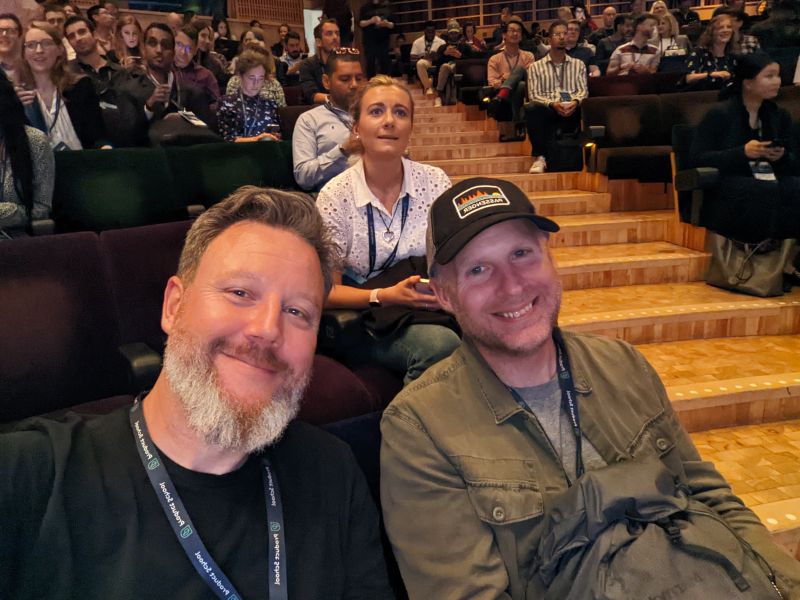A Day with Product School
It’s a rare occasion when I get out of the usual office routine and pack myself off for a day of adventure and learning in my industry. I think I suffer the same guilt many of us do when these days come up - I’ll spend a whole day thinking and learning, and not enough doing. Conversely I feel the same when I’m spending all my time doing, and not enough time thinking about my work. I put the guilt aside for a day and accepted Product School’s invite to ProductCon London a few weeks back. Aided and abetted by my colleague from 383 and Canvas, Ollie Disney, we took off in the search of leading product thinking and new inspiration. We had a blast, can’t you tell?

When I go to an industry event, I always say that if I get 2-3 takeaways in a day, it was time well spent. And on this occasion it definitely was. Here are the highlights from my top three talks of the day:
Inclusion first, then Diversity
This was POWERFUL. And a good message to anyone that’s on their Diversity and inclusion journey and struggling with where to start. It’s easy to take the shortcut to representation quotas. After all, there is a stack of empirical data out there on the business case for diverse teams - see BCG’s study on How Diverse Leadership Teams Boost Innovation for starters. But what use are quotas if they don’t combat the main problem - Inclusion. And if people don’t feel included, how can you create high performing product teams? Georgie Smallwood, Chief Product Officer at Tier, did a fantastic job explaining that the quickest route to failure is to focus on diversity alone. Building scalable global products requires diverse thinking and Georgie broke down the practical components to forming a strong, inclusive team:
- HARD SKILLS - Do you have every base covered? From SQL and Data Analysis to Project Management and Testing, are all the relevant points of view and qualities covered?
- TEAM SKILLS - Is there a diverse mix of soft skills? The person that reflects, the person that challenges? And most importantly do you have a ‘glue’ person - someone who binds everyone together, and notices the small things, like individual worries of a team member, that no one else does?
- UNICORNS - Do you have a person that can do and solve everything? Probably a bad idea. They don’t exist and you shouldn’t try and find them either.
The day after the conference, I attended a training event on corporate inclusion and the message was the same. Forget diversity, focus on inclusion and business diversity will come as a result. So Georgie was definitely onto something! There was so much to absorb in her talk and I’ve barely scratched the surface, so I’ll leave you temporarily in her company instead…
Funnels or Flywheels?
This was one of the more provocative talks of the day, as Elena Verna, Head of Growth at Amplitude, challenged perceptions about the usefulness of the traditional sales funnel model. Her claim was that funnels are the route to linear growth at best, and it's easy to see why. You load more leads at the top, you get more sales. It's relatively simple and in your control, and not a lot needs to change in the execution. But what if we focused on product led growth instead? Elena shared Miro as a good example. Within Miro’s software, a new user joins and start’s creating community whiteboards for ideation. They invite another, or several users to the board, and that creates several new users, all getting passionate about using Miro and paying a licence fee. Then they invite new users on their projects… That’s a viral flywheel, it keeps turning and growing distribution through the product itself - in a sustainable way. It’s also product-led sales, as you’re letting the customer experience the value of your product, and creating a dependency to secure the sale. No more negotiating over months! And that critical mass of dependency also helps in the roadmap. Optimising features for learning or failure means you get quick feedback, and that informs the future state of your product roadmap. Everyone wins in the end!
There was so much to unpack in Elen’s talk on product led growth, so I won’t steal the show further. Enjoy…
The Gold behind the Data
Katie Cummings, VP of Product at Deliveroo, stimulated thinking on approaches to customer insight. When you’re mining product data for dominant behaviour patterns, you can fall into the trap of focusing on your existing mass of users, looking at averages and then keep working on the same old features. That’s everyone taken care of right? But those averages hide the real insights, they are habits on what’s already built. What are new users doing that’s unexpected? Are new behaviours and requirements developing that would be useful to explore and develop for the benefit for all users? Katie’s advice was to trust the anecdotes in the data, they are the devil’s advocate to your typical analysis of the product experience. And they are key to closing the gap between your product team and the users that are out there. Second guessing is evidently the key to data fluency, the driver for user empathy, and most importantly, better products. Here’s Katie with her talk..
So that wraps up my experience of ProductCon London. It was great to get out for the day, be in the product community, and bring back those all important takeaways. Tickets are now open for the next year’s event in February 2023. Maybe I’ll see you there?
What's inspired me recently...
A lot of folks have a love-hate relationship with Simon Sinek’s rhetoric, but I’m firmly in the love camp. And the 56 seconds here is good reason why. A few days ago I was presenting and someone talked to me about their perception of the disconnect between leaders at the top of a business, and the people in the work. “Leaders only ever care about money and profit.” “Aha” I said, “let me show you a little video” Yes the numbers are a big deal and often overshadow the underlying ambition. But if the numbers don’t get achieved then that ambition never gets realised. We give business leaders a bad rap, but most of the time they want the same thing we do, and just focus relentlessly on the means to get there. They also forget to give the same message to their people that Simon does below. Even his sceptics have to agree this is a good lesson right?
built by: huzzah!

